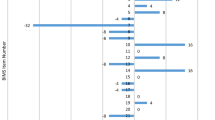Abstract
This article presents a description of a South African mathematics teacher’s struggles to mediate a new national assessment tool called the Common Tasks for Assessment with her grade 9 learners, who are unprepared for the assessment. The purpose of the study is to describe and to identify the constraints on the teacher’s mediation attempts. The study is set in the context of an under-resourced classroom with a large number of learners, from disadvantaged backgrounds, who have serious problems with fundamental mathematical concepts. The analytical framework for the study draws upon actions, processes, objects and schemas theory and Valsiner’s zone theory. Data for the case study were generated from seven lesson observations, two interviews with the teacher and a focus group interview with a group of learners from the class. The findings reveal that the teacher’s practice was impeded by the learners’ (non)readiness for the task, the task demands, the restrictions of the curriculum demands, as well as the fact that the modern assessment policy was irreconcilable with the classroom reality. The article concludes by calling for a closer alignment of curriculum implementation plans with the classroom realities of teachers such as the one presented in the study.
Similar content being viewed by others
References
Bansilal, S. (2006). Grade 9 mathematics teachers’ professional knowledge: A situative perspective. Perth, Australia: Curtin University of Technology.
Bansilal, S., & Wallace, J. (2008). National performance assessment in a South African contexts: Issue of classroom implementation and task design. African Journal for Research in Science, Mathematics and Technology Education, 12, 77–92.
Brodie, K. (2004). Re-thinking teachers’ mathematical knowledge: A focus on thinking practices. Perspectives in Education, 22(1), 65–80.
Brodie, K. (2010). Teaching mathematical reasoning in secondary school classrooms. New York: Springer.
Cobb, P., Yackel, E., & Wood, T. (1993). Discourse, mathematical thinking, and classroom practice. In E. Forman, N. Minick, & C. Stone (Eds.), Contexts for learning: Sociocultural dynamics in children’s development (pp. 91–119). Oxford, UK: Oxford University Press.
Cobb, P., Stephan, M., McClain, K., & Gravemeijer, K. (2001). Participating in classroom mathematical practices. The Journal of the Learning Sciences, 10(1&2), 113–163.
Department of Education. (2002). A draft framework for the development of Common Tasks for Assessment: (CTA). Pretoria, South Africa: DoE.
Department of Education. (2003). National curriculum statements grades 10–12 (General) mathematics. Pretoria, South Africa: DoE.
Dubinsky, E. (1991). Reflective abstraction in advanced mathematical thinking. In D. Tall (Ed.), Advanced mathematical thinking (pp. 95–123). Deventer, The Netherlands: Kluwer.
Dubinsky, E., Weller, K., Mcdonald, M. A., & Brown, A. (2005). Some historical issues and paradoxes regarding the concept of infinity: An APOS-based analysis: Part 1. Educational Studies in Mathematics, 58, 335–359.
Galligan, L.(2008). Using Valsiner. In M. Goos, R. Brown, & K. Makar (Eds.), Proceedings of the 31st annual conference of the Mathematics Education Research Group of Australasia (pp. 211–218). Brisbane: MERGA.
Goos, M. (2009). Investigating the professional learning and development of mathematics teacher educators: A theoretical discussion and research agenda. In R. Hunter, B. Bicknell, & T. Burgess (Eds.), Crossing divides: Proceedings of the 32nd annual conference of the Mathematics Education Research Group of Australasia. Palmerston, New Zealand: MERGA.
Graven, M. (2004). Mathematics teacher learning, communities of practice and the centrality of confidence. Unpublished doctoral thesis, University of the Witwatersrand Johannesburg.
Hussain, M. A., Monaghan, J., & Threlfall, J. (2009). Extending Valsiner’s complex system: An emergent analytic tool for understanding students’ mathematical learning in practice. Paper presented at the PME33.
Johnson, S., Hodges, M., & Monk, M. (2000). Teacher development and change in South Africa: A critique of the appropriateness of transfer of northern/western practice. Compare: A Journal of Comparative and International Education, 30(2), 179–192.
Mattson, E., & Harley, K. (2003). Teacher identities and strategic mimicry in the policy/practice gap. In K. Lewin, M. Samuel, & Y. Sayed (Eds.), Changing patterns of teacher education in South Africa (pp. 284–305). Cape Town, South Africa: Heinemann.
Merriam, S. B. (1988). Case study research in education: A qualitative approach. San Francisco, CA: Jossey-Bass.
National Council of Teachers of Mathematics. (1991). Professional standards for teaching. Reston, VA: NCTM.
National Council of Teachers of Mathematics. (2000). Principles and standards for school mathematics. Reston, VA: NCTM.
Peressini, D., & Knuth, E. (1998). Why are you talking when you could be listening? The role of discourse in the professional development of mathematics teachers. Teaching and Teacher Education, 14(1), 107–125.
Polkinghorne, D. E. (1995). Narrative configuration in qualitative analysis. In J. A. Hatch & R. Wisniewski (Eds.), Life history as narrative (pp. 5–23). London: Falmer.
Porter, P. (1980). Policy perspectives on the study of educational innovations. Educational Evaluation and Policy Analysis, 2(4), 73–84.
Prawat, R. S. (1989). Teaching for understanding: Three key attributes. Teaching and Teacher Education, 5(4), 315–328.
Rogan, J. M. (2007). An uncertain harvest: A case study of implementation of innovation. J. Curriculum Studies, 39(1), 97–121.
Sfard, A. (1991). On the dual nature of mathematical conceptions: Reflections on processes and objects as different sides of the same coin. Educational Studies in Mathematics, 22, 1–36.
Stake, R. E. (2000). Case studies. In N. K. Denzin & Y. S. Lincoln (Eds.), Handbook of qualitative research (2nd ed., pp. 435–454). Thousand Oaks, CA: Sage.
Taylor, N., & Vinjevold, P. (1999). Getting learning right. Report of the president’s education initiative research project. Witwatersrand, South Africa: Joint Education Trust.
Valsiner, J. (1987). Culture and the development of children’s action: A cultural–historical theory of developmental psychology. Chichester, UK: John Wiley &Sons.
Valsiner, J. (1997). Culture and the development of children’s action: A theory of human development (2nd ed.). New York: John Wiley & Sons.
Vandeyar, S., & Killen, R. (2007). Educators’ conceptions and practice of classroom assessment in post-apartheid South Africa. South African Journal of Education, 27(1), 101–115.
Yin, R. K. (2009). Case study research. Design and methods (4th ed.). Los Angeles: Sage.
Author information
Authors and Affiliations
Corresponding author
Rights and permissions
About this article
Cite this article
Bansilal, S. Assessment reform in South Africa: opening up or closing spaces for teachers?. Educ Stud Math 78, 91–107 (2011). https://doi.org/10.1007/s10649-011-9311-8
Published:
Issue Date:
DOI: https://doi.org/10.1007/s10649-011-9311-8




